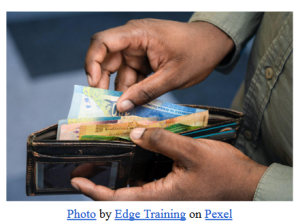By Tania Bore
Photos: YouTube Screenshots\Tania Bore
If you had asked Fauzia Muthoni about her career plans in 2010 her answer would have been simple. She was migrating from Kenya to Qatar to work there as a receptionist. However, that dream quickly unraveled when instead of arriving in Qatar and beginning her period of employment as a receptionist, she was instructed to get on a plane to Saudi Arabia.

Unable to contact her family or anyone she knew in Qatar after the shock of the news, she felt her best option was to do as she was told. Once within Saudi Arabia, Fauzia was coerced into being a maid for various families and abused.
Unfortunately, Fauzia’s story as an abused domestic worker in Saudi Arabia is not uncommon.
Globally, the country is infamous for its substandard provision of labor human rights. This reputation has spread so far and wide that many think of Saudi Arabia as one of the least safe countries to work in. An article from Voice of America published in September 2021 shared, “Kenya’s Foreign Ministry says 89 Kenyans, most of them domestic workers, have died in Saudi Arabia in the past two years.”
Most of the reasons behind their passing were purported to be death by suicide, natural cause, or cardiac arrest. However, even Kenya’s ministry of foreign affairs was suspicious, stating “it is not
possible that these young people are all dying of cardiac arrest.” Sure enough, autopsies performed within Kenya on the bodies revealed that abuse may have occurred. Families of victims have even gone so far as to dismiss Saudi Arabian death certificates that allege the their members died through suicide.
“The rate at which our Kenyans girls continue to die in Saudi Arabia is very alarming,” shared Mike Sonko, the previous governor of Nairobi. “It’s…high time relevant government authorities start
conducting [postmortems] once the bodies land in our country to ascertain the cause of death and also to confirm if any body parts are missing.”
In April 2020, Amnesty International shared that Kenyans in the Middle East employed as domestic workers frequently expressed that they were sexually or physically abused, made to engage in
forced labor, or not paid sufficiently.
Despite this, the Kenyan government is actively working to try to send more Kenyans to Saudi Arabia. President William Ruto went on a trip to Saudi Arabia just last month where he managed to
obtain more employment opportunities for Kenyans in the country. He had promised to return to its capital Riyadh this month to secure more jobs for Kenyans and arrived there recently on November 10 for the inaugural Saudi-African Summit.
In May, President Ruto also announced his intention to sign multiple bilateral international labor agreements to help Kenyans find employment outside of the country. Already containing approximately 80,000 Kenyan workers, majority of which are classified as domestic, Saudi Arabia was one of the nations on the list.
Cabinet Secretary Alfred Mutua has highlighted that there are Kenyans in Saudi Arabia who have jobs that pay well. “In Saudi I met Kenyans and some are working well. I met nurses, teachers and hotel managers. Mostly it’s women who suffer and those who go for domestic work,” shared Mutua. “I had private meetings with the women and they disclosed how they are suffering.”
Forced to work for 18 hours and sleep for three, Fauzia persevered while working for people that felt she was their slave as they had “purchased her.” She also went through abuse during her time as a domestic worker. “The boys of the house…know you’re a slave to them,” she said. “You can’t confront them.”
In the same way that Fauzia found it difficult to confront her oppressors in part because of the financial dynamics of the situation, much of the reluctance the Kenyan government has exhibited in
confronting Saudi Arabia concerning the mistreatment of its domestic workers can be explained through looking at its economic reliance on the Middle Eastern country.

Since 2015, diaspora remittances have been the greatest source of Kenya’s foreign cash flow, even outranking foreign cash flow from tourists, chief agricultural exports like tea, and foreign direct
investments. Within the pool of nations sending significant remittances, there is one country whose remittances to Kenya have consistently grown at the quickest rate: Saudi Arabia. As of now, Saudi Arabia has even surpassed the United Kingdom and is only trailing behind the United States in remittances to the third world country.
Putting Kenya’s economic reliance on remittances together with an increasing unemployment rate within the nation reveals why Kenyan citizens and Kenyan government alike are hard pressed for
alternative solutions and are willing to risk or continue working in such difficult conditions.
Perhaps this is why when, in light of accusations concerning the mistreatment of a Kenyan domestic worker in Saudi Arabia, the then Kenyan Embassy in Riyadh instead chose to express gratitude
towards the Saudi Arabian government for giving Kenyans opportunities.
Some Kenyans bend over backwards so much that they even turn on the Kenyan women experiencing abuse in Saudi Arabia.
Chairperson of the Association of Skilled Migrant Agencies of Kenya (ASMAK) Francis Wahome stated that most Kenyan girls were treated poorly because they were not obedient workers.
“Our girls have no discipline. And I am sorry to say this,” shared Wahome. “Why do you think that a Saudi Arabian would pay a lot of money until the housemaid gets there only to mistreat her? That is a wrong word, we should not be discriminating against these people.”
He said this when a Commission on Administrative Justice on Systemic Investigation report on the issues that Kenyan migrant workers in Saudi Arabia face had been released. The report detailed how Kenyan women had gone days or months without eating.
Fauzia Muthoni herself faced her own share of troubles when it came to the diet she was provided with while in Saudi Arabia as it consisted of leftovers. “They kept the food in their fridge and they’ll take it like a week, two weeks, and they’ll still request you to eat that food of which for them they cannot eat,” she revealed.
However, the ASMAK chairperson labeled the accounts in the report that detailed how Kenyan women had gone days or months without eating as “illogical.”
Macharia Kamau, the then Kenya foreign affairs principal secretary, also diminished the gravity of the issue by shifting the blame to Kenyan women. He said that in order to be employed in Saudi Arabia they would need to be submissive, a trait he claimed Kenyan domestic workers do not possess. He also stated that elected officials in Kenya must be cautious when handling the situation so as not to damage the work opportunities for Kenyans in the Middle East.
In the midst of key Kenyan actors blaming their fellow citizens engaged in domestic work in Saudi Arabia, what exactly can Kenyans in bad employment situations over there do?
In reality the Kafala employment system in Saudi Arabia, despite experiencing some reforms in March 2021, continues to leave domestic workers stuck in poor working conditions. “Many of the African women who travel to the Gulf States to work as domestic workers find themselves caught in terrible working conditions,” The France 24 Observers reports.
The system links the legal status of a foreign employee in Saudi Arabia to their boss. On numerous occasions, employers have stripped employees of their passports and retained complete power over them. These working conditions and lack of legal protections leaves domestic workers in toxic work environments with only two choices. Tough it out until the end of their work contract, or run away and become undocumented. (Those who pursue the latter option, often a perilous decision, are referred to by Kenyans back home as a “kemboi.”)
Dalalas take advantage of this situation to make money. Deceitfully luring their victims through assuring them they can provide better employment prospects, these middlemen prey on Kenyan women facing hard times in Saudi Arabia. They pledge to bring these women to ‘safe places’ with more desirable employment offers in exchange for cash, when in reality the dalalas continue to exploit the migrant workers.
Turning to the Kenyan Embassy in Saudi Arabia also proved to be of no help for some Kenyans. A lawsuit against the Kenyan government by Kenyans who used to be employed in the Gulf States as
domestic workers alleged that the Kenyan Embassy in Saudi Arabia “shut [its] doors” to helpless workers in need despite them seeking help from the consulate representatives there. This ended up “forcing them to be detained at deportation centres and agency accommodation facilities, where life was demeaning for a human being.”

While the litigants lawsuit highlights a gap in the Kenyan government response to the issue, it would be remiss not to cover the various steps the Kenyan government has taken to help citizens abroad who are mistreated.
The Kenyan government created an emergency distress line for Kenyans in Saudi Arabia with the intention that respondents remain available for callers at all times. Alfred Mutua, the current foreign
affairs cabinet secretary, also went to Saudi Arabia concerning the problem.
“We have had conversations with the Saudi government asking why their people are abusing our young men and women,” stated Mutua. “They said we need to expose them and will get them arrested.” The Kenya Labor Ministry has also promised to set up two safe houses in Saudi Arabia that Kenyans working there can turn to for help.
Employees from the Kenya Labor Ministry have also spoken with the Philippine embassy in Saudi Arabia concerning “best practices of labor export” to Saudi Arabia. (Both Uganda and the Philippines have at one point stopped sending domestic workers to Saudi Arabia, despite securing notable remittances from their citizens in the Middle Eastern country, due to the extensive allegations of abuse.)
The Kenyan Ministry of Labour and Social Protection has also investigated hundreds of recruitment agencies and halted at least 26 rogue agencies from being able to dispatch workers internationally. In addition, the Kenyan government has provided the public with a list of vetted agencies it trusts, and has made these agencies guarantee a security bond that can be utilized to bring Kenyan workers experiencing hardship abroad back home.
Knowing which recruitment agency she could trust would have likely saved Fauzia Muthoni from the ordeal she went through in being promised one job and then forced to provide another service,
especially in such difficult conditions abroad.
Opening up about some of the pressures a domestic worker can go through, she spoke about how other men would ask for sexual favors which would leave a female worker in a difficult situation. Either they provide the favor and in doing so risk going to jail or even being killed by the woman of the house, or they refuse and the man could get revenge by accusing them of something.
Now, Kenyan authorities are taking action to help solve this problem through preparing domestic workers who are headed to the Middle East for their time there through educating them on their rights abroad.
Saudi Arabia has also taken some steps to provide help for female migrant domestic workers in troubling circumstances through creating holding centers that provide a variety of services including
food, mental health treatment, legal aid, and repatriation assistance. Unfortunately, some of these centers have also faced allegations of mistreating the workers they are supposed to be serving.
Following the Kenyan government’s actions to procure job opportunities internationally for its people, rights groups shared that they felt sufficient action had not yet been taken to deal with the issue of domestic workers in Gulf States like Saudi Arabia experiencing poor treatment.
Rights groups Hakijamii and Kituo cha Sheria are backing a lawsuit against the Kenyan government by Kenyans that previously engaged in domestic work who used to be employed in the Gulf
States. The plaintiffs assert that the government did not take appropriate action to guard against them experiencing “modern-day slavery and human trafficking.”
The litigation advocates for the “immediate suspension” of all worker deployment to the Middle East until Kenya provides “basic minimums.” It also calls for monetary compensation for the victims or their families.
In order for Kenya to stop having to send its workers into such grueling conditions, it needs to develop alternative sources of income domestically through job generation within the nation and
internationally through being able to offer other countries items of value that range outside of the usual allotment of raw materials and the other normalized exports.
Until then, Kenya will likely continue to view the domestic workers it deploys to the Gulf state in the same way parents facing economic hardship would look at a daughter they are sending away to work as maid in a richer household that is also notorious for abuse. Kenyan rights groups and other advocates resemble the image of a grieving mother worried to death that her daughter will suffer and demanding the child remain at home. The Kenyan government and other advocates for the labor migration in turn bear the outline of a father who feels the situation can’t be helped so he cautions his daughter to be on her “best behavior” and soldier on to make the most of the circumstance. One screaming at the man taking their daughter away, the other resigned to accept the situation as he realizes he has no choice.
As Kenyans, we must do better for our young women. We have far more to offer the world than domestic services.
Despite the difficulties she faced and against the wishes of her Saudi Arabian employer, Fauzia managed to make her way back to Kenya.
Successfully repatriated, she has gone on to work with KUDHEIHA, the Kenya Union of Domestic Hotels Educational Institutions Hospitals & Allied Workers, to help women who want to engage in employment immigration know their rights. She has also spoken with teenage women in her community, joined an empowerment network focusing on informal sector employee capacity building,
and shared her story with others.

Miss Bore, who writes for Black Star News, lives in the Rift Valley Region of Kenya.

















